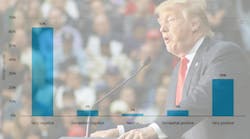AWWA Applauds Water Infrastructure Legislation
The American Water Works Association (AWWA) applauded the introduction of S. 335, the Water Infrastructure Finance and Innovation Act of 2013 (WIFIA) by U.S. Sen. Jeff Merkley (D-Ore.), calling it an important step forward in rebuilding U.S. water and wastewater infrastructure.
“One year ago this week, AWWA published its ‘Buried No Longer’ study that demonstrates that more than $1 trillion will be needed over the next 25 years to replace and expand aging drinking water infrastructure. Wastewater needs are similar,” said AWWA Executive Director David LaFrance. “WIFIA would provide low-interest loans to help local communities build more infrastructure with less money. It represents just the right balance between local responsibility and federal assistance."
“The time is right for real, workable solutions to the nation’s unprecedented water infrastructure challenge,” he added.
AWWA, the world’s largest water organization with more than 50,000 members, has testified before Congress multiple times on the need for a WIFIA and through hundreds of face-to-face meetings with U.S. representatives and senators. In April, AWWA will bring more than 100 water utility managers to Washington D.C. for its Water Matters! Fly-In, where utility leaders will conduct more than 400 meetings with senators and representatives in support of WIFIA.
AWWA believes WIFIA should complement—not replace—existing state revolving funds (SRFs), by specifically addressing projects that are too big for most SRFs to fund. WIFIA could also allow multiple smaller projects to be packaged into a single WIFIA application, ensuring that the benefits of the program are available to communities of any size and circumstance.
“Water and wastewater services are essential for public health protection, our environment, fire protection, economic vitality and the quality of life we enjoy,” LaFrance said. “When we invest in our essential water systems, we also create jobs. WIFIA can help accomplish all these things at a lower cost to water consumers.”
Source: AWWA


